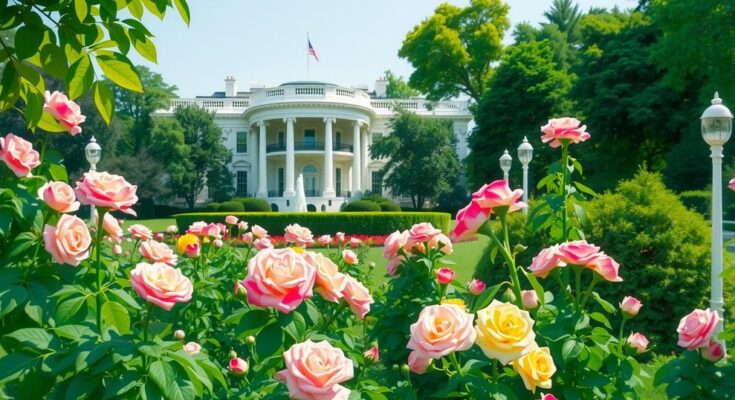President Trump will announce new tariffs from the White House on Wednesday, aiming to address unfair trade practices. The tariffs are expected to take immediate effect, with a 25% auto import tariff following in April. The potential for tariffs may lead India and others to lower their own tariffs in response, as discussions for a bilateral trade agreement progress.
United States President Donald Trump is anticipated to unveil new ‘country-specific’ tariffs from the White House Rose Garden on Wednesday, local time. This announcement comes at a time when global trade is precariously balanced. Press Secretary Karoline Leavitt confirmed, “The president will be announcing a tariff plan that will roll back the unfair trade practices that have been ripping off our country for decades.”
Trump’s announcement is scheduled for 4 PM local time, translating to 1:30 AM on Thursday in India. The tariffs are set to take immediate effect upon the President’s announcement, although Reuters reported that a 25% tariff on auto imports will only commence on April 3.
Leavitt did not provide specifics regarding the tariffs or the negotiation options with other nations, stating, “Certainly, the president is always up to take a phone call, always up for a good negotiation, but he is very much focused on fixing the wrongs of the past and showing that American workers have a fair shake.” The administration aims to impose reciprocal tariffs to encourage manufacturing return to the U.S. and address perceived unfair trade practices globally.
The prospect of these reciprocal tariffs has prompted countries such as India to reconsider their own tariff policies. Trump mentioned, “I think I heard a little while ago that India will be dropping its tariffs and why didn’t anyone do it a long time ago. A lot of countries will be dropping their tariffs.” While the Indian government has yet to comment on potential tariff reductions, India and the United States have initiated talks aimed at finalizing a bilateral trade agreement (BTA) in the coming months, with the goal of improving market access and decreasing tariff and non-tariff barriers.
President Trump’s impending announcement of new tariffs aims to address longstanding trade imbalances and encourage manufacturing in the United States. The expected reciprocal tariffs may compel countries like India to revise their tariff policies, fostering further negotiations and enhancing bilateral trade agreements. The global trade landscape remains uncertain, and these developments could have significant implications for international relations and economic cooperation.
Original Source: www.business-standard.com




